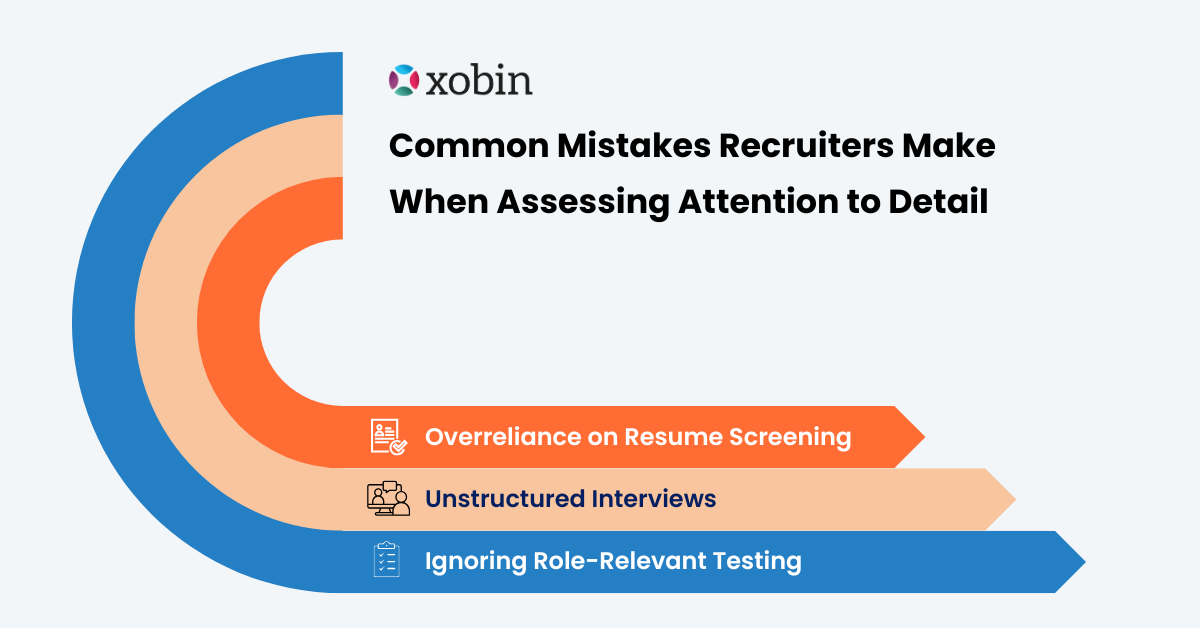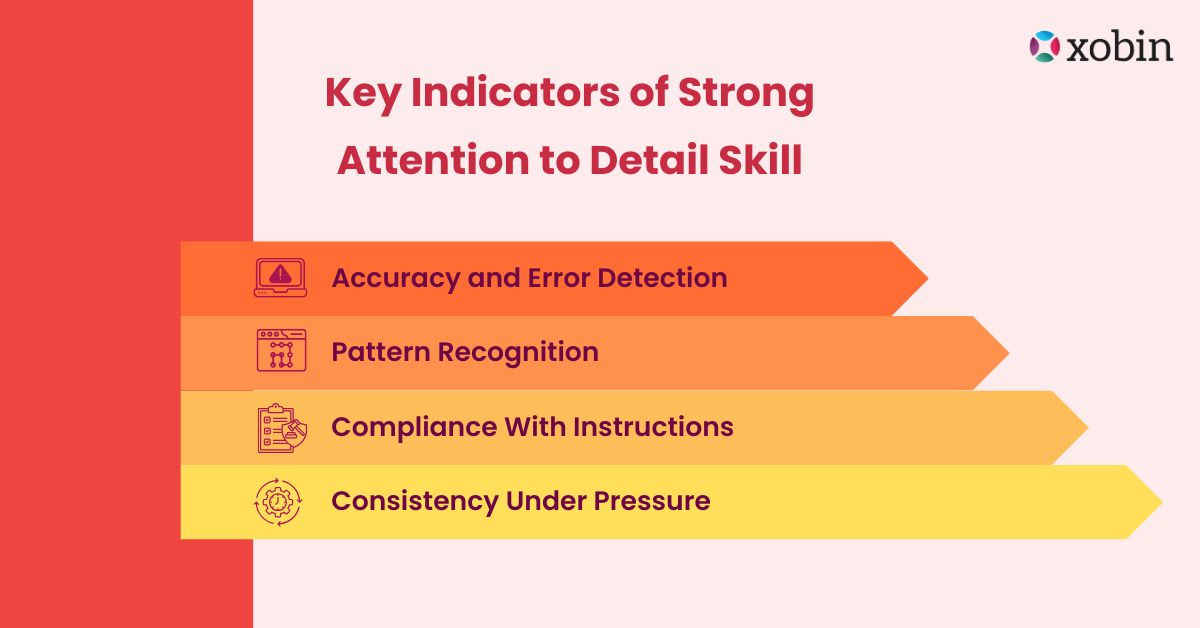A candidate with strong attention to detail can spot errors, follow processes thoroughly, and deliver high-quality work consistently. Yet, screening candidates for the attention to detail skill during hiring is one of the hardest challenges for recruiters. Many candidates claim to be detail-oriented, but only a structured evaluation process reveals the truth.
Table of Contents
This blog explores how HR leaders and recruiters can accurately assess attention to detail skills in candidates using behavioral insights, structured assessments, and AI-powered tools to make better hiring decisions.
TL;DR – Key Takeaways!
- Attention to detail directly impacts productivity, compliance, and quality of outcomes.
- Common hiring mistakes include relying solely on resumes or unstructured interviews.
- Use behavioral interview questions, cognitive ability tests, and attention-to-detail assessments to measure attention to detail skills objectively.
- Rely on measurable indicators: error detection ability, pattern recognition, task accuracy, and consistency.
- Combine the attention to detail assessment test and psychometric testing for unbiased and consistent evaluation.
- Xobin’s AI-powered assessment platform helps recruiters measure attention to detail accurately through behavioral and aptitude testing.
Why Attention to Detail Matters in Hiring
Attention to detail as a skill is more than just “being careful.” It represents a combination of accuracy, concentration, consistency, and cognitive focus. Roles across industries like finance, operations, data entry, product design, HR, software testing, audit, compliance, and customer support depend on rigorous attention to detail.
However, identifying this trait during hiring becomes difficult because:
- Candidates often overstate the skill on resumes.
- Traditional interviews fail to reveal accuracy and concentration abilities.
- Recruiters rarely have standardized, role-specific tests.
- Remote hiring increases the need for objective assessment rather than intuition.
Therefore, organizations need structured, testable, and scalable candidate evaluation methods.
Additionally, attention to detail is linked with higher job performance. Research from the Society for Industrial and Organizational Psychology (SIOP) shows that employees who score high on conscientiousness and accuracy metrics outperform peers in quality-based KPIs.

Common Mistakes Recruiters Make When Assessing Attention to Detail Skill

Many recruiters unknowingly use flawed methods to gauge attention to detail. Let’s address some pitfalls:
1. Overreliance on Resume Screening
Resumes reveal achievements, not behavioral patterns. Candidates who appear organized on paper might not demonstrate the same precision in real work settings. Moreover, AI resume screening tools without context may overlook candidates with strong observational skills but weaker keyword optimization.
2. Unstructured Interviews
Asking general questions like “Are you detail-oriented?” rarely yields truthful insights. Candidates tend to respond aspirationally rather than behaviorally. Instead, use situational and behavioral questions that reveal past examples of meticulous work.
3. Ignoring Role-Relevant Testing
Forgetting to test the attention to detail skill in action leads to subjective judgments. Practical assessments such as proofreading exercises, data validation tasks, or logic puzzles offer measurable evidence of attention to detail.
Key Indicators of Strong Attention to Detail Skill

To evaluate attention to detail skill effectively, assess for the following attributes:
1. Accuracy and Error Detection
Accuracy shows how meticulously a candidate performs tasks. For example, reviewing documents, entering data, debugging code, or validating information requires laser-sharp focus. A high-performing candidate will consistently spot errors and inconsistencies.
2. Pattern Recognition
The ability to identify trends, mismatches, or anomalies is essential in roles like finance, analytics, QA testing, and operations. Candidates strong in this area demonstrate fast yet precise analytical thinking.
3. Compliance With Instructions
Candidates who follow multi-step instructions without deviation typically excel in detail-oriented roles. Even a small oversight reveals potential future risks in real job tasks.
4. Consistency Under Pressure
Attention to detail often drops under time constraints. Evaluate how candidates maintain accuracy when working on timed or complex tasks.
The Most Effective Methods to Assess Attention to Detail
1. Behavioral Interview Questions
Structured interview questions help uncover behavioral patterns related to detail orientation. For example:
- “Tell me about a time you caught an error others missed.”
- “Describe a task where attention to detail significantly impacted results.”
- “Share a situation where missing a detail caused issues. What did you learn?”
Look for answers demonstrating ownership, process adherence, and the ability to reflect on their work. Candidates who naturally include quantifiable details tend to possess strong attentiveness.
2. Work Sample Tests
Simulate real tasks that the role demands. For instance:
- Marketing roles: Editing mock campaigns for grammar and tone consistency.
- Engineering roles: Debugging a code snippet.
- Finance roles: Spotting inconsistencies in data entries.
These exercises reveal how candidates process information under time constraints, key to assessing focus and thoroughness.

3. Cognitive Ability & Aptitude Assessments
Cognitive ability test and aptitude assessments measure accuracy, concentration, and cognitive focus through:
- Error-spotting tasks
- Pattern recognition exercises
- Symbol or number matching
- Rapid comparison tasks
Such tests are highly predictive of performance, especially in roles requiring precision and analytical thinking.
Moreover, test results offer quantifiable metrics, accuracy rate, time taken, and error percentage, giving recruiters clear hiring signals.
4. Situational Judgment Tests (SJTs)
Situational Judgment Tests (SJTs) present realistic workplace scenarios and ask candidates to choose or rank the best responses.
Example: “If you’re given a report with a tight deadline, but you notice minor inconsistencies, what do you do?”
This assesses:
- Decision-making
- Prioritization
- Accuracy under constraints
SJTs offer valuable insight into a candidate’s natural tendencies.
5. Psychometric Testing
Psychometric evaluations assess behavioral traits like conscientiousness, focus, and diligence, all essential components of attention to detail. These tests offer a reliable, bias-free measure of a candidate’s natural working style.
6. Writing or Documentation Review Tasks
Many roles require precise communication. Assign candidates:
- A proofreading task
- A data documentation exercise
- A process documentation review
This evaluates both clarity and precision, especially for roles in HR, operations, or customer service.

Expert Strategies to Evaluate Attention to Detail Across Roles
Different roles require different dimensions of attentiveness. Here’s how to tailor your approach:
| Job Role | Assessment Type | Example Task |
| Software Developer | Coding Assessment | Identify and fix logical bugs in a program |
| Graphic Designer | Work Sample | Spot inconsistencies in layout and alignment |
| Data Analyst | Aptitude + Data Accuracy Test | Validate a dataset for missing values |
| HR Executive | Behavioral + Psychometric | Assess consistency in documentation and follow-ups |
| Customer Support | Communication Test | Evaluate accuracy in written and verbal responses |
Looking to simplify precision-based hiring? Try Xobin’s AI-powered Attention-to-Detail Assessments today!
Book A DemoAssess Attention to Detail with Xobin!
Xobin, an AI-powered Talent Assessment Platform, empowers recruiters to measure attention to detail accurately and at scale.
- Pre-Employment and Skill Assessments: Xobin offers 3,400+ customizable skills tests, including cognitive and accuracy-based evaluations tailored to each job role.
- Behavioral Testing: Uses validated psychometric models to assess traits like conscientiousness and focus.
- AI-Based Evaluation: Automatically scores open-ended answers for clarity, logic, and structure, eliminating manual subjectivity.
- Proctoring for Integrity: EyeGazer and browser activity monitoring ensure candidates remain attentive during assessments.
- Actionable Reports: Recruiters receive visual dashboards highlighting performance on accuracy, focus, and error detection metrics.
With Xobin, hiring teams can confidently identify candidates who consistently deliver precision and quality, ensuring error-free workflows and stronger productivity.
Ready to identify detail-oriented talent with precision? Book a personalized demo with Xobin today and experience smarter, bias-free hiring.
FAQs
1. What is the best way to test a candidate’s attention to detail?
Work sample tests and cognitive assessments are the most reliable ways to evaluate accuracy and error-detection ability.
2. Why is attention to detail important for employers?
It reduces errors, improves productivity, and ensures consistent work quality in roles across finance, operations, HR, tech, and compliance.
3. Can attention to detail be improved over time?
Yes, training, process discipline, and better task management help employees strengthen this skill.
4. How do behavioral interviews assess detail orientation?
They uncover past behaviors that reveal patterns of accuracy, thoroughness, and responsibility.
5. Do cognitive tests accurately measure attention to detail?
Yes. Tasks involving pattern recognition, comparison speed, and error spotting are scientifically validated predictors of job accuracy.
6. How does AI help in assessing attention to detail?
AI scoring tools like Xobin evaluate responses consistently, flag inconsistencies, and ensure unbiased assessment at scale.







